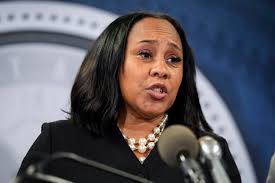
Overview of the Georgia Election Interference Case
A year has passed since former President Donald Trump and several associates were indicted in Georgia on charges related to alleged election interference. The case, brought forward by Fulton County District Attorney Fani Willis, has seen significant developments but remains stalled as of mid-2024. This article explores the current status of the case, the key players involved, and the implications of its slow progress.
Table of Contents
Background of the Indictment
In August 2023, Donald Trump, along with 18 co-defendants, was indicted on charges stemming from a purported scheme to overturn the results of Georgia’s 2020 presidential election. The indictment alleges that Trump and his associates engaged in a coordinated effort to falsify election results, pressure state officials, and disrupt the certification process. The case includes charges of racketeering, conspiracy, and solicitation of election officials, marking a high-profile legal battle that underscores the broader national debate over election integrity.
The Key Players
Several notable figures are central to the Georgia election interference case:
- Donald Trump: The former president is the most prominent defendant, facing charges of soliciting officials to alter the election outcome and making false statements regarding election fraud.
- Rudy Giuliani: Trump’s former personal attorney, Giuliani, is accused of playing a key role in promoting baseless claims of election fraud and pressuring Georgia officials.
- Mark Meadows: Trump’s former Chief of Staff is alleged to have been involved in efforts to influence state officials and disrupt the election certification process.
- Others: The indictment includes a range of individuals from Trump’s inner circle, each facing various charges related to the alleged scheme.
Current Status of the Case
As of August 2024, the Georgia election interference case has encountered several hurdles that have stalled its progress. Key issues contributing to the delay include:
- Legal Challenges and Appeals: Defendants have mounted numerous legal challenges, including requests for dismissals, changes of venue, and procedural delays. Appeals regarding these motions have further slowed the proceedings.
- Coordination with Federal Cases: The case has been complicated by ongoing federal investigations and prosecutions related to the January 6th Capitol riot and other election interference allegations. Legal teams have sought to align or differentiate their strategies based on developments in these federal cases.
- Complexity of the Evidence: The volume and complexity of evidence involved in the case require thorough examination. Defendants’ legal teams have requested extensive time to review evidence and prepare their defense, contributing to the delays.

Political and Legal Implications
The slow pace of the Georgia case has significant implications:
- Political Impact: The delays have allowed Trump to continue his political activities, including campaigning for the 2024 presidential election. Supporters argue that the case is politically motivated and designed to undermine his candidacy, while critics assert that it reflects the seriousness of the charges against him.
- Legal Precedent: The case sets a precedent for how allegations of election interference are handled in the legal system. The outcome could influence future legal strategies and the application of election laws.
Public and Media Response
The stalled case has drawn considerable media attention and public interest. Coverage has focused on the legal maneuvers of the defendants, the implications for Trump’s political career, and the broader ramifications for the integrity of democratic processes. Public opinion remains divided, with ongoing debates about the motivations behind the charges and their impact on the upcoming election.
Conclusion
A year into the Georgia election interference case against Donald Trump and his associates, the legal proceedings have experienced notable delays. These delays are due to a combination of legal challenges, coordination with other investigations, and the complexity of the evidence. As the case continues to unfold, it will likely remain a focal point of both legal and political discourse, with its ultimate resolution carrying significant implications for the future of election integrity and the political landscape in the United States.







